Related Research Articles

Mahjong or mah-jongg is a tile-based game that was developed in the 19th century in China and has spread throughout the world since the early 20th century. It is commonly played by four players. The game and its regional variants are widely played throughout East and Southeast Asia and have also become popular in Western countries. The game has also been adapted into a widespread online entertainment. Similar to the Western card game rummy, Mahjong is a game of skill, strategy, and luck. To distinguish it from mahjong solitaire, it is sometimes referred to as mahjong rummy.

War is a simple card game, typically played by two players using a standard playing card deck — and often played by children. There are many variations, as well as related games such as the German 32-card Tod und Leben.
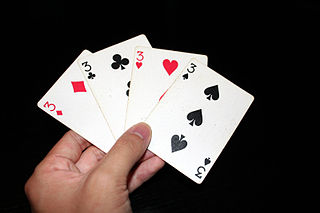
Gin rummy, or simply gin, is a two-player card game variant of rummy. It has enjoyed widespread popularity as both a social and a gambling game, especially during the mid twentieth century, and remains today one of the most widely-played two-player card games.
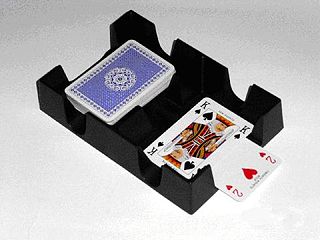
Canasta is a card game of the rummy family of games believed to be a variant of 500 Rum. Although many variations exist for two, three, five or six players, it is most commonly played by four in two partnerships with two standard decks of cards. Players attempt to make melds of seven cards of the same rank and "go out" by playing all cards in their hands. It is "the most recent card game to have achieved worldwide status as a classic".

Crazy Eights is a shedding-type card game for two to seven players. The object of the game is to be the first player to discard all of their cards. The game is similar to Switch and Mau Mau.

500 rum, also called pinochle rummy, Michigan rummy, Persian rummy, rummy 500 or 500 rummy, is a popular variant of rummy. The game of canasta and several other games are believed to have developed from this popular form of rummy. The distinctive feature of 500 rum is that each player scores the value of the sets or cards they meld. It may be played by 2 to 8 players, but it is best for 3 to 5.
Spite and Malice, also known as Cat and Mouse or Screw Your Neighbor, is a traditional card game for two or more players. It is a reworking of the late 19th century Continental game Crapette and is a form of competitive solitaire, with a number of variations that can be played with two or three regular decks of cards. It is descended from Russian Bank.

Wyatt Earp is a rummy-like card game first released in 2001. The game is named after Wyatt Earp, a famous lawman, and is set in the American Old West. It is manufactured by Rio Grande Games and was created by Mike Fitzgerald and Richard Borg for Alea.

Rummy is a group of matching-card games notable for similar gameplay based on matching cards of the same rank or sequence and same suit. The basic goal in any form of rummy is to build melds which can be either sets or runs and either be first to go out or to amass more points than the opposition.
Tonk, or tunk, is a matching card game, which combines features of knock rummy and conquian. Tonk is a relatively fast-paced game that can be played by 2-4 players. It can be played for just points or for money wagered.

Monopoly: The Card Game is loosely based on the board game Monopoly. The idea is to draw, trade and organize cards into "color-groups" along with bonus cards. Players take turns drawing and discarding cards until one completes a hand. The value of each player's hand is then counted and they receive the amount of Monopoly money they have earned. The first person to collect $10,000 wins.

Four color cards is a game of the rummy family of card games, with a relatively long history in southern China. In Vietnam the equivalent game is known as tứ sắc.
Civilization: The Card Game is a card game designed by Civilization IV lead designer Soren Johnson, based on Civilization IV. It was developed in 2006 by Firaxis Games, as a bonus in the Sid Meier's Civilization Chronicles boxed set, and is not available independently.

Carioca is a Chilean card game similar to Rummy style card games with many variations. The variation described below is Perla's Cariocas.
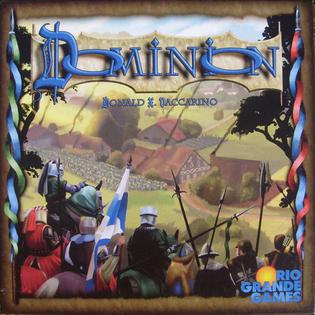
Dominion is a card game created by Donald X. Vaccarino and published by Rio Grande Games. It was the first deck-building game, and inspired a genre of games building on its central mechanic. Each player begins with a small deck of cards, which they improve by purchasing cards from a common supply that varies from game to game. Cards can help the player's deck function, impede their opponents, or provide victory points. As of March 2022, fourteen expansion packs to the original Dominion have been released.

Ten pennies is a multi-round Rummy-style card game, possible originating in Chicago. The major features different from most Rummy-style games are the limited purchasing of ten additional cards, and the winner wins the coins used in the game. The rules and strategy are simple enough for children to play, while still being challenging to adult players. Playing with money is not required and anything such as chips or toothpicks may be used.
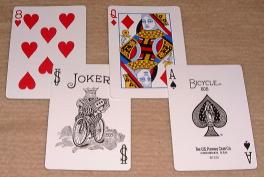
Ponytail Canasta is a variation of the card game Canasta. The rules for Canasta were standardized in North America around the 1950s and it was this version of the game that gained worldwide popularity. In many countries, classic Canasta is still played in more or less its original form, sometimes alongside a number of variations.

Jungle Speed is a card game created by Thomas Vuarchex and Pierric Yakovenko in 1991. First self-published and now published by Asmodee Editions, it is played with non-standard playing cards. An expansion and all-in set have been published.
The following is a glossary of poker terms used in the card game of poker. It supplements the glossary of card game terms. Besides the terms listed here, there are thousands of common and uncommon poker slang terms. This is not intended to be a formal dictionary; precise usage details and multiple closely related senses are omitted here in favor of concise treatment of the basics.
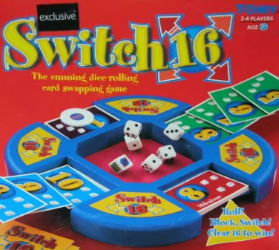
Switch 16 is a children's board game published by Tomy in 2001.
References
- ↑ "Review & Giveaway: Clumsy Thief + Last Letter: Teach Opportunistic Test-Taking Skills".
- ↑ "Clumsy Thief". www.academicschoice.com.
- ↑ "Search for "Clumsy Thief game"". MAJOR FUN.
- ↑ http://www.parents-choice.org/product.cfm?product_id=32195&StepNum=1&award=aw 2013-10